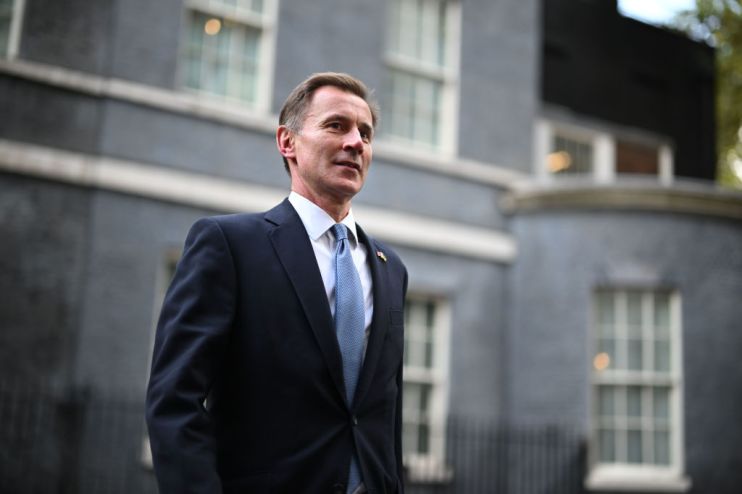IFS: No room for tax cuts or spending rises at March budget despite Jeremy Hunt pocketing £60bn windfall

There is no room for tax cuts or spending increases at the March budget despite Jeremy Hunt being handed an around £60bn windfall from lower energy prices and interest rates, a top economic think tank has forecast today.
The Chancellor will be held back from handing households and businesses a tax giveaway due to the UK economy growing at a snail’s pace over the coming years, according to the Institute for Fiscal Studies (IFS).
A £13bn reduction in the cost of capping typical household energy bills at £2,500, lower “debt interest, a shallower recession and stronger revenues for a given size of the economy” has beefed up the UK’s public finances, the think tank said.
Borrowing is now on track to be around £30bn lower this year and next.
But most of that saving will be temporary due to the government ditching the cap later this year.
As a result, “the room for either permanent tax cuts or spending increases that are not offset elsewhere remains very limited,” the IFS said.
The warning suggests Hunt and Prime Minister Rishi Sunak next month will be limited to offering one-off support packages to help households cope with the cost of living crisis.
“Short-term savings cannot finance permanently higher spending,” Isabel Stockton, senior research economist at IFS, said, adding “the Chancellor likely has less fiscal room for manoeuvre than recent headlines might suggest.”
Energy watchdog Ofgem said yesterday the price cap price will drop from £4,279 per year to £3,280 for the average household, saving the government more than £1bn and giving Hunt some leeway to scrap a planned increase to £3,000 in April.
Britain has suffered from anaemic economic growth since the financial crisis, eroding families’ capacity to withstand soaring living costs and the government’s capacity to either reduce the tax burden or ramp up spending.
Taxes as a share of the economy, known as the tax burden, is on track to hit its highest level since just after World War Two following Hunt’s decision to raise taxes and cut spending by £55bn in November.
Paul Johnson, director of the IFS, said a “very serious national discussion” needs to be thrashed out sooner rather than later about whether public services take the hit or taxes keep rising if growth continues to be awful.
Latest calculations from the Bank of England estimate the country can only grow at a rate of below one per cent each year without stoking inflation.
“This dismal rate would be just over half the economy’s poor growth rate in the decade between the financial crisis and the pandemic, and only around a third of its average in the 50 years before the financial crisis (2.7 per cent),” the IFS said.
Most economists reckon Britain is set to slip into a short and relatively mild recession this year.
A former rate setter at the Bank of England has accused Hunt and Sunak of being “unwilling to admit the [growth] problem even exists” in his blueprint to lift UK’s long-term economic performance.
Michael Saunders, a former member of the monetary policy committee and now senior economic advisor to Oxford Economics, said: “The debate over the UK’s low potential growth has barely got out of first gear.”
He urged the chancellor to raise public sector investment to three per cent of GDP and take on some of the burden of childcare costs to stimulate the UK’s supply side or risk another “long period of stagnant living standards”.
Striking public sector workers can expect Hunt and Sunak to shun handing them an inflation-busting pay rise due to the limited room in the public finances caused by weak growth.
Using a fraction of the Treasury’s £13bn-£14bn of reserves to give civil servants a one-off pay boost backdated to the start of this year would “pose fewer fiscal challenges but would leave public sector staff permanently worse off,” the IFS said.
Even spending a further £9bn to match public sector pay with the private sector “would still leave public sector workers worse off (on average) than in 2020–21,” the think tank added, raising the chances of strikes being a permanent fixture of this year.
A Treasury spokesperson said: “We are focused on getting debt down in the medium term, and we have already taken difficult decisions to put the public finances back on track.”
“As the IFS highlight, economic risks remain, so we remain focused on our plans to reduce debt, halve inflation and grow the economy.”
For all the latest Lifestyle News Click Here
For the latest news and updates, follow us on Google News.

